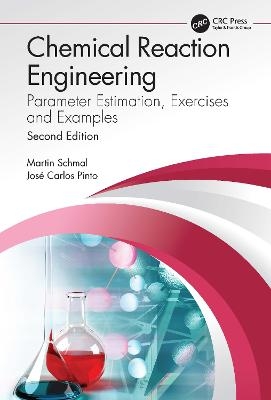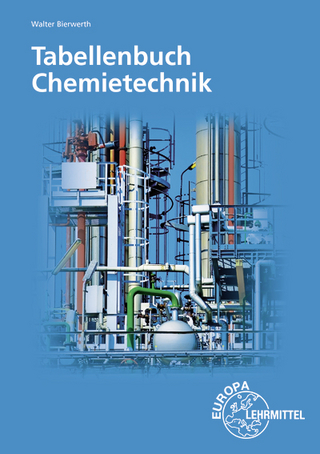
Chemical Reaction Engineering
CRC Press (Verlag)
978-0-367-49446-9 (ISBN)
The first English edition of this book was published in 2014. This book was originally intended for undergraduate and graduate students and had one major objective: teach the basic concepts of kinetics and reactor design. The main reason behind the book is the fact that students frequently have great difficulty to explain the basic phenomena that occur in practice. Therefore, basic concepts with examples and many exercises are presented in each topic, instead of specific projects of the industry. The main objective was to provoke students to observe kinetic phenomena and to think about them. Indeed, reactors cannot be designed and operated without knowledge of kinetics.
Additionally, the empirical nature of kinetic studies is recognized in the present edition of the book. For this reason, analyses related to how experimental errors affect kinetic studies are performed and illustrated with actual data. Particularly, analytical and numerical solutions are derived to represent the uncertainties of reactant conversions in distinct scenarios and are used to analyze the quality of the obtained parameter estimates. Consequently, new topics that focus on the development of analytical and numerical procedures for more accurate description of experimental errors in reaction systems and of estimates of kinetic parameters have been included in this version of the book. Finally, kinetics requires knowledge that must be complemented and tested in the laboratory. Therefore, practical examples of reactions performed in bench and semi-pilot scales are discussed in the final chapter.
This edition of the book has been organized in two parts. In the first part, a thorough discussion regarding reaction kinetics is presented. In the second part, basic equations are derived and used to represent the performances of batch and continuous ideal reactors, isothermal and non-isothermal reaction systems and homogeneous and heterogeneous reactor vessels, as illustrated with several examples and exercises. This textbook will be of great value to undergraduate and graduate students in chemical engineering as well as to graduate students in and researchers of kinetics and catalysis.
Martin Schmal graduated in Chemical Engineering at the Engineering Faculty of the Catholic University of S. Paulo (1964), he received a Master’s degree in 1966 from the Federal University of Rio de Janeiro/COPPE, Brazil, and obtained his doctorate degree (Dr. Ing.) from the Technische Universität Berlin, Germany (1970). He became an associate professor at the Chemical Engineering Department of the Federal University of Rio de Janeiro in 1970, became Full Professor in 1985 and has been Emeritus since 2008. He specialized at the Institut du Recherche sur la Catalyse, Lyon, France (1981) and at the University of Karlsruhe, Germany (1983). He has been teaching Kinetics and Reactors to undergraduate students at the Chemical Engineering School, Catalysis to graduate students at COPPE and a Postgraduate course in Engineering for over 40 years, since 1973. The main research topics at Nucleous of Catalysis are catalysis, the catalytic process and nanoscience. He maintains close contacts with the industry, in particular with Petrobras and various petrochemical industries: Oxiteno, Copene, Copesul, Petroquimica União, Braskem, Degussa and others, developing processes and catalysts, and has more than 20 patents to his name. He is a member of the Brazilian Academy of Science (elected in 1999) and of the International Catalysis Society (since 2000). He has received several awards and in particular the Humboldt Research Award from the Humboldt Foundation – Germany (2002), the Premio Mexico for Science and Technology (Science Consulting Council, Mexico, 2002); the Senior Researcher award from the Ibero-American society (2010); the SCOPUS award – Elsevier-CAPES (2009) and finally the Distinguished Professor award from Coppe – Federal University of Rio de Janeiro (2013). He has published more than 220 articles in international journals; has presented and published 250 papers in Annals of International Congresses, Symposia and Meetings and published the following books: Chemical Kinetics and Reactor Design (1. Ed. 1982, 2. Ed. 2010), Heterogeneous Catalysis (2012) and Natural Gas Conversion VIII – Surface Science (2011). His other activities include being peer reviewer for the following journals: Journals for Physical Chemistry, Journal of Catalysis, Surface Science, Applied Catalysis A and B, Catalysis Today, ACS Catalysis, Angewandte Chemie International Edition, Catalysis Letters, International Journal of Hydrogen Energy, Material Science, etc. He was on the editorial board of Applied Catalysis A (1992–1999) and of Catalysis Today (2000–2006). He was Founder and President of the Brazilian Catalysis Society (1998–2006). His external collaborators include H.J. Freund (Max Planck Berlin), E. Lombardo (Argentina), Schlögl and Behrens (Max Planck Berlin), Albert Vannice (Penn State University, USA) and Ted Oyama (Virginia Tech, USA). José Carlos Costa da Silva Pinto graduated in Chemical Engineering from the Federal University of Bahia (1985) and obtained a DSc degree in Chemical Engineering from the Federal University of Rio de Janeiro (1991). He is currently a Full Professor of Programa de Engenharia Química/COPPE, Federal University of Rio de Janeiro, and member of Programa de Pós-Graduação em Engenharia de Processos Químicos e Bioquímicos / Escola de Química, Federal University of Rio de Janeiro. José Carlos has been a member of the editorial committees of different scientific journals and has been a full member of the Brazilian Academy of Sciences since 2010 and of the National Engineering Academy since 2014. José Carlos has experience in Chemical Engineering, with emphasis on chemical reactors, and particular emphasis in the area of modeling, simulation and control of polymerization reaction systems. José Carlos has published more than 450 papers in peer reviewed scientific journals and has conducted hundreds of joint projects with partners in both industrial and academic institutions.
1. Definitions and stoichiometry 2. Chemical equilibrium 3. Kinetic of reactions 4. Molar balance in open and closed systems with chemical reaction 5. Determination of kinetic parameters 6. Kinetics of multiple reactions 7. Non-elementary reactions 8. Polymerization reactions 9. Kinetics of liquid-phase reactions 10. Heterogeneous reaction kinetics 11. Parameter estimation 12. Experimental designs 13. Kinetic exercises 14. Elementary concepts of the collision theory 15. Ideal reactors 16. Specific reactors 17. Comparing reactors 18. Combination of reactors 19. Transport phenomena in heterogeneous systems 20. Multiphase reacting systems 21. Heterogeneous reactors 22. Deactivation 23. Reactor exercises
| Erscheinungsdatum | 16.08.2021 |
|---|---|
| Verlagsort | London |
| Sprache | englisch |
| Maße | 174 x 246 mm |
| Gewicht | 1424 g |
| Themenwelt | Naturwissenschaften ► Chemie ► Technische Chemie |
| Technik | |
| ISBN-10 | 0-367-49446-9 / 0367494469 |
| ISBN-13 | 978-0-367-49446-9 / 9780367494469 |
| Zustand | Neuware |
| Haben Sie eine Frage zum Produkt? |
aus dem Bereich


